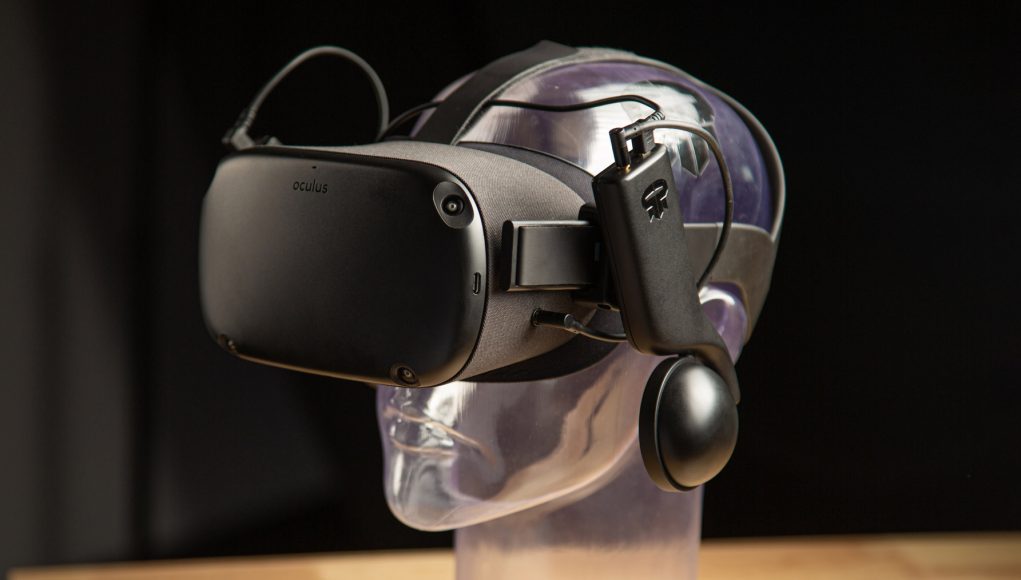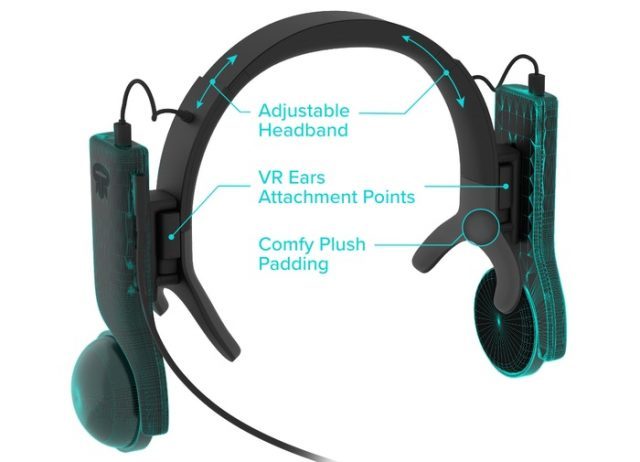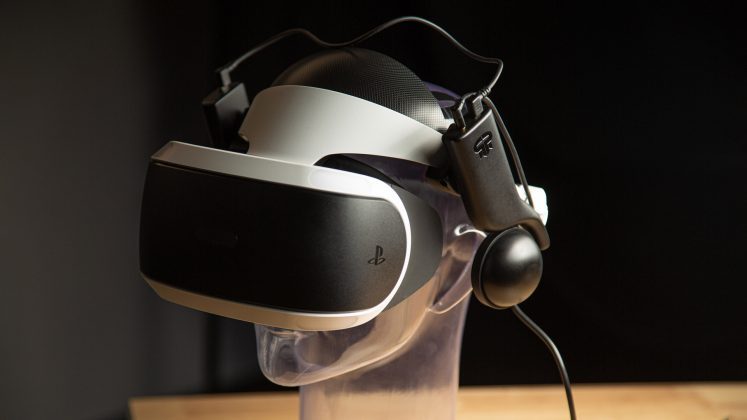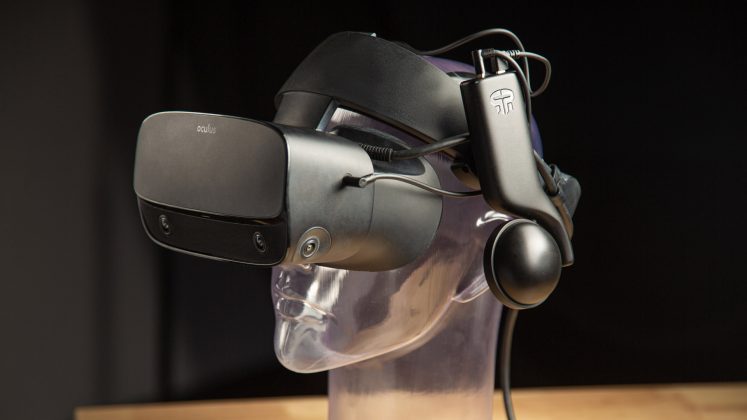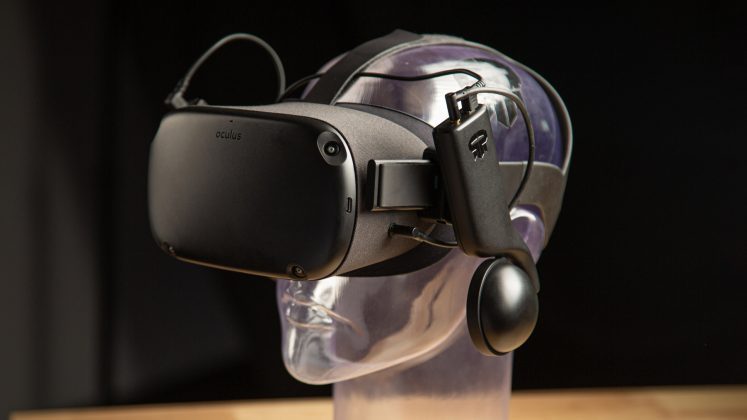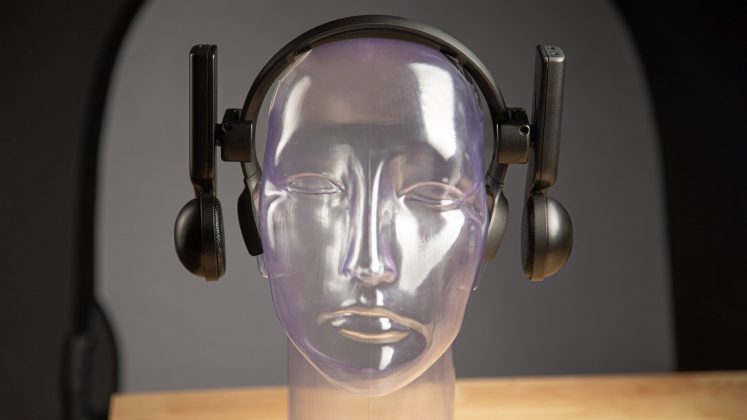Rebuff Reality has taken its latest VR accessory, VR Ears, to Kickstarter with the hopes of bringing an enhanced audio solution to all major headsets, including those with sub-par or no integrated audio like PSVR, Quest, and Rift S. In its final week, the project is well past its goal as it closes in on $200,000.
Update (May 15th, 2020): In its last week on Kickstarter, the VR Ears crowdfunding campaign has raised $181,000. While the project has blasted past its $30,000 goal and may well reach around $200,000 by the end, it will likely fall short of the next stretch goal at $250,000.
Still, the overwhelming success of the campaign shows the demand for better audio on headsets which either have sub-par audio solutions (like Rift S and Quest) or those which have no integrated audio at all (like PSVR).
It remains to be seen how well the VR Ears will actually perform in the audio department, but we’ll be looking forward to testing them once they become available.
Update (May 5th, 2020): The VR Ears Kickstarter has reached $155,000, or 518% of its $30,000 goal. Though the project is well funded, the next stretch goal (a 30% discount voucher for a carrying case) is still a fair distance away at $250,000. With 16 days left though, it’s not out of the question that the campaign gets there.
Update (April 27th, 2020): The VR Ears Kickstarter has more than quadrupled its $30,000 goal, now with just over $125,000 pledged by backers of the project, with more than three weeks remaining in the campaign.
The campaign met its first stretch goal at $100,000, unlocking a 30% discount voucher for VR Ears headstrap (which allows the accessory to be used like a regular pair of headphones without a VR headset). The headstrap will cost $30 before discount.
Update (April 22nd, 2020): The VR Ears Kickstarter has more than doubled its $30,000 funding goal right out of the gate. With 28 days remaining of a 30 day campaign, the project is 247% funded with $75,000 pledged and rapidly approaching its first stretch goal at $100,000 (see below update listing all stretch goals).
757 backers have bought into the project so far. The $80 ‘Super Early Bird’ tier has sold out all 500 units. The $90 ‘Early Bird’ tier has sold 218 of 2,000 units. If that tier sells out, this will leave only the uncapped $100 ‘Kickstarter Special’ tier (and above).
See the original article below for more background on VR Ears and the Kickstarter project.
Update (April 21st, 2020): The VR Ears Kickstarter launched today, aiming to bring an ‘off-ear’ headphone accessory to many major VR headsets. The company behind the project, Rebuff Reality, is aiming to raise $30,000. The company has confirmed that the off-ear headphones will support Rift CV1, Rift S, Quest, original Vive (only with DAS), Vive Pro, Vive Cosmos, PSVR, Valve Index, and Pimax headsets which use the rigid head-mount.
Prices for the clip-on audio accessory start at $80 for the first 500 backers, $90 for the next 3,000, and $100 thereafter. Rebuff Reality says that after the Kickstarter the headphones will retail for $150. The company expects the $80 batch to ship starting in November and the $90 and $100 batches expected in December.
The VR Ears headstrap, which allows the headphones to double as a normal pair of headphones without attaching to a VR headset, looks to be available after the Kickstarter as an additional accessory.
Just a few hours after the campaign launched, the VR Ears Kickstarter has already reached 70% of its goal. With 29 days remaining in the campaign, it seems certain to succeed. Rebuff Reality seems confident too, as it has already outlined stretch goals far exceeding the initial $30,000 goal:
- $100,000 – 30% discount voucher for VR Ears headstrap accessory
- $250,000 – 30% discount voucher for VR Ears carrying case
- $500,000 – 30% discount voucher for 5ft charging cable
- $750,000 – 30% discount voucher for VR Ear boom mic accessory
- $1,000,000 – All of the above accessories included for free with any Kickstarter purchase of VR Ears
The original article, which explores the audio landscape of VR headsets and the ‘off-ear’ approach to headset audio, continues below.
Original Article (April 17th, 2020): Since the consumer VR industry kicked off in 2016, more and more headsets are heading toward integrated audio solutions. While the original Vive and PSVR launched without any on-board audio (expecting the user to plug in included earbuds, or their own headphones), both have since made moves to rectify that. HTC launched the Vive Deluxe Audio Strap (AKA DAS) which improved the fit of the headset and added on-board audio, while an updated version of PSVR eventually added more convenient earbuds.
The latest headsets from Oculus—the Go, Quest, and Rift S—all have speakers hidden inside their headstraps. While this is convenient because there’s no headphones to get in the way when putting the headset on, all three leave us wishing for better quality and positional audio accuracy, both of which bring big boosts to immersion.
Valve’s Index headset seems to have found an ideal solution; its ‘off-ear’ audio design means the headphones aren’t in the way when putting the headset on, but at the same time they offer excellent audio quality with high volume and great positional accuracy.
VR Ears is a third-party audio accessory aiming to emulate the Index off-ear audio design and bring it to pretty much any VR headset out there thanks to a clip-on approach. The company hasn’t said exactly which headsets it will support, but it has teased compatibility with PSVR, Vive DAS, Rift S, Quest, Pimax, and it can even be used as a standard pair of headphones without a VR headset.
Rebuff Reality, the company behind several other VR accessories, is bringing VR Ears to Kickstarter on April 21st, starting at 10AM PT (you local time here). The company hasn’t yet announced how much they hope to raise for the product, or the expected shipping timeline, but that will be made clear when the Kickstarter launches next week.
Despite emulating the off-ear audio design of Index, there’s no telling what kind of quality VR Ears will bring to the table. Valve invested substantial time into developing the headphones for Index—including the use of some novel drivers that VR Ears are unlikely using—so we’ll be interested to see what the final product ends up sounding like.
Either way, VR Ears has the potential to substantially improve both volume and positional audio accuracy over the likes of Go, Quest, and Rift S, thanks to the use of much larger drivers and the ability to position the speakers directly adjacent to the ear.

